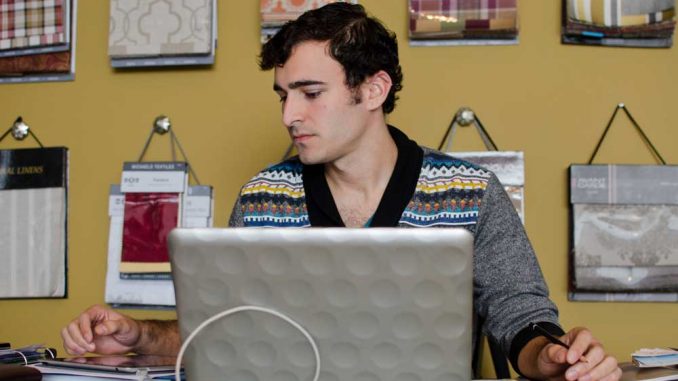
While other graduates were starting careers, John Infante embarked on a three-month excursion to a castle in Halvad, a city in the state of Gujarat, India.
Despite traveling in 120-degree heat with little human interaction, it was an experience he said changed his life.
A 2011 graduate, Infante double-majored in anthropology and broadcasting telecommunications & mass media. During a visual anthropology course, he connected with Professor Jayasinhji Jhala.
Jhala liked Infante’s final project for the course so much that he encouraged him to travel to his palace in India to study art. There, he could immerse himself in a different culture, different elements and develop as an artist.
“As an artist, I had the worst experience in India that anyone could expect to have,” Infante said. “I felt a strong dislike for India and a frustration with the environment. But after coming back to the United States, I realized that from that misery, frustration and angst, I found my creativity.”
This realization sparked Infante’s idea to host other artists in this kind of environment. He said he wanted to create a sanctuary that would nurture artists while facilitating a change in them artistically and personally. With the support of Jhala, Infante’s vision became the Jhalavad Sanctuary for the Arts, or JSA.
For the past two years, Infante has taken college students, many from Temple, and professors working on artistic residencies to a palace in Dhrangadhra, India, where the JSA is located. Those who travel to the JSA can work alongside teachers and translators from the village as they study traditional Indian art, yoga, meditation, snake charming, film, dance, writing, music, philosophy and sculpture – Infante’s specialty.
Jhala is the director of Temple’s graduate and undergraduate tracks in the anthropology of visual communication. His family is native to the Dhrangadhra, Gujarat region and they own the Ajitnivas Palace and the Halvad Citadel.
“Dhrangadhra has been a center for stone carving since before the ninth century,” Jhala said. “This region features many artistic traditions and a unique regional dialect.”
An environment like this can be stimulating for artists.
“The most rewarding part of working for the JSA is seeing how students have changed after their India experience,” Infante said. “While in India, they’re all very overwhelmed. This forces some to go inwards and some to go outwards. It changes who they are as a person and who they are as an artist.”
“The sanctuary is the canvas and the new ephemeral medium is the person transformed by their experience in India,” Jhala said.
Closer to home, Infante is a co-owner of Copious Space, located in West Philadelphia. Copious Space is a gallery that hosts art and film exhibitions and fundraiser events for the JSA. All proceeds from the events and art go toward doing community work in and around Gujurat.
“Our goal is to fund water irrigation projects, pollution projects and to spread health awareness,” Infante said. “I want to convey an artistic push to be a catalyst for change in a developing country rather than something like Coca-Cola or building highways. Because the cost of living in India is so low, money made just from the sale of a painting can go a very long way and do so much good for the community.”
Infante travels to India for three or four months out of the year. As founder of the JSA and the consultant for Jhala’s properties, he said he’s always looking for ways he can transform their palaces and other facilities into something new and useful.
Infante and Jhala said they believe this is only the beginning for the JSA. It is just a small piece of a larger vision.
Infante hopes the program will evolve into a year-long experience for students, as opposed to just a month of study in India. He also wants to expand the JSA and host more graduate-level students at the sanctuary. Infante even hopes to live in India year-round someday.
All of these are long-term goals, but in the meantime, Infante is working to open a second art gallery in Fishtown, which will also benefit the JSA and the surrounding community.
“Everything for the JSA is my blood and my effort,” Infante said. “Until we can get staff from this country and not just in India, it’s pretty much a one-man show. It’s a lot of work, but it’s worth it.”
Mary Salisbury can be reached at mary.salisbury@temple.edu.


Be the first to comment